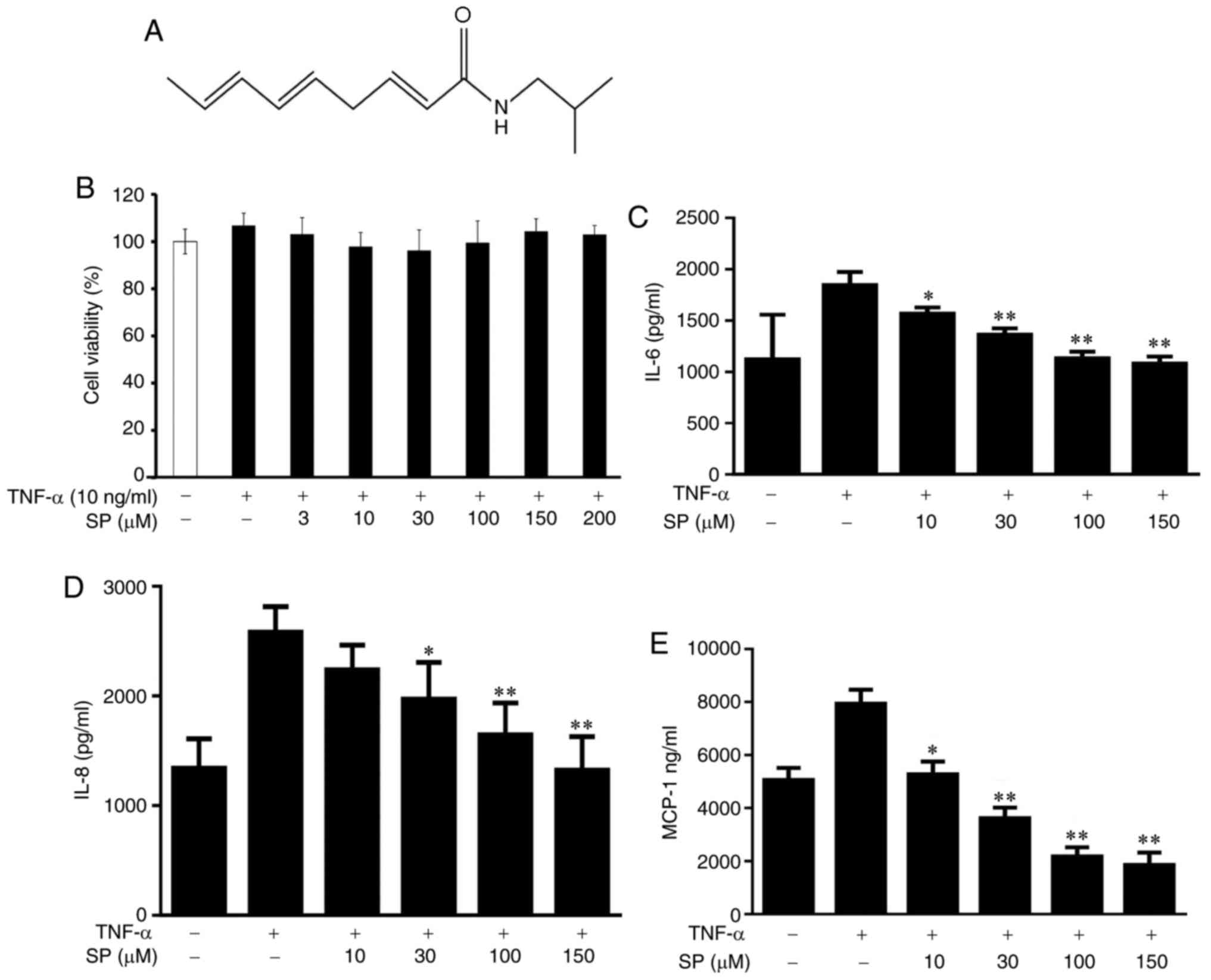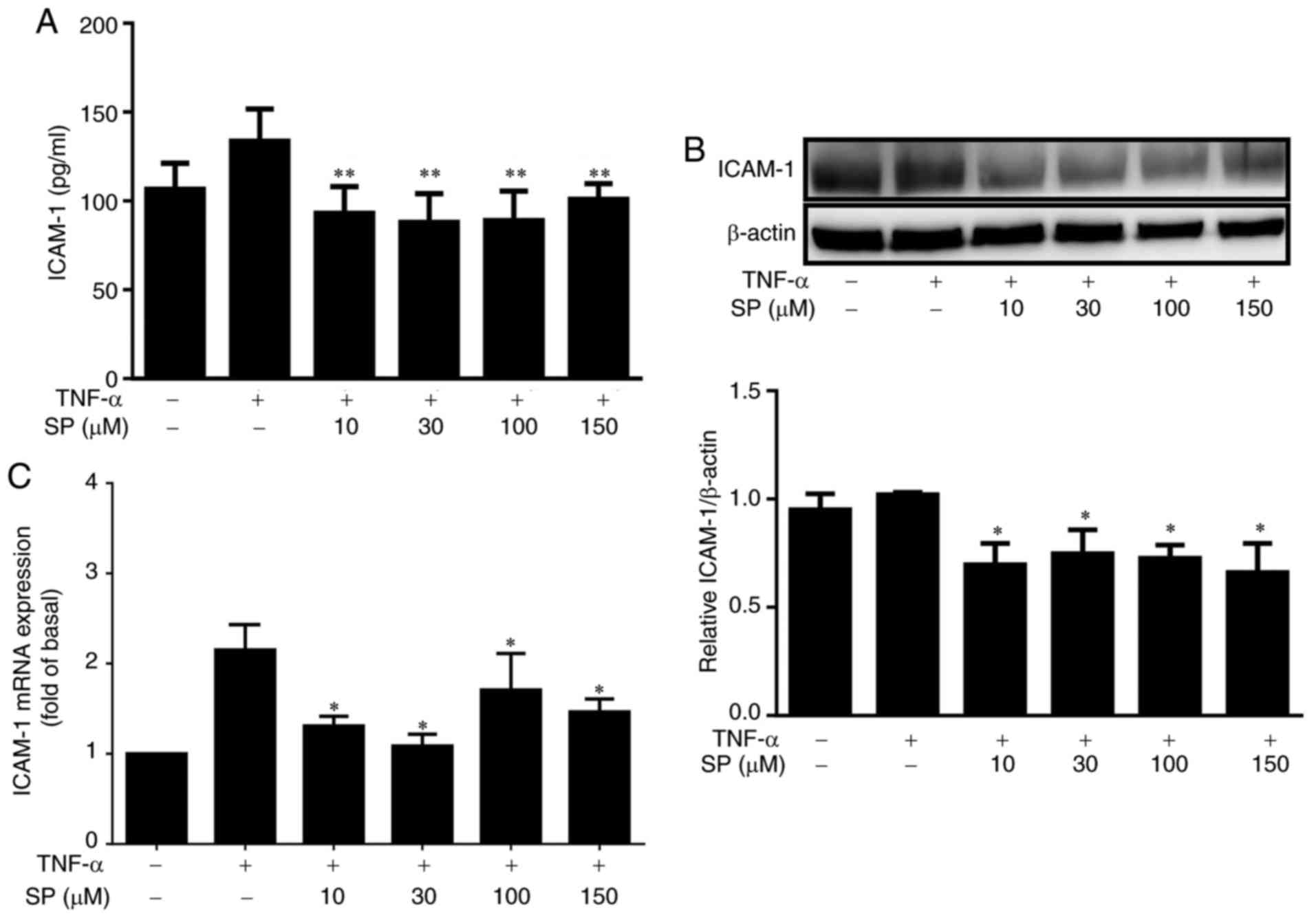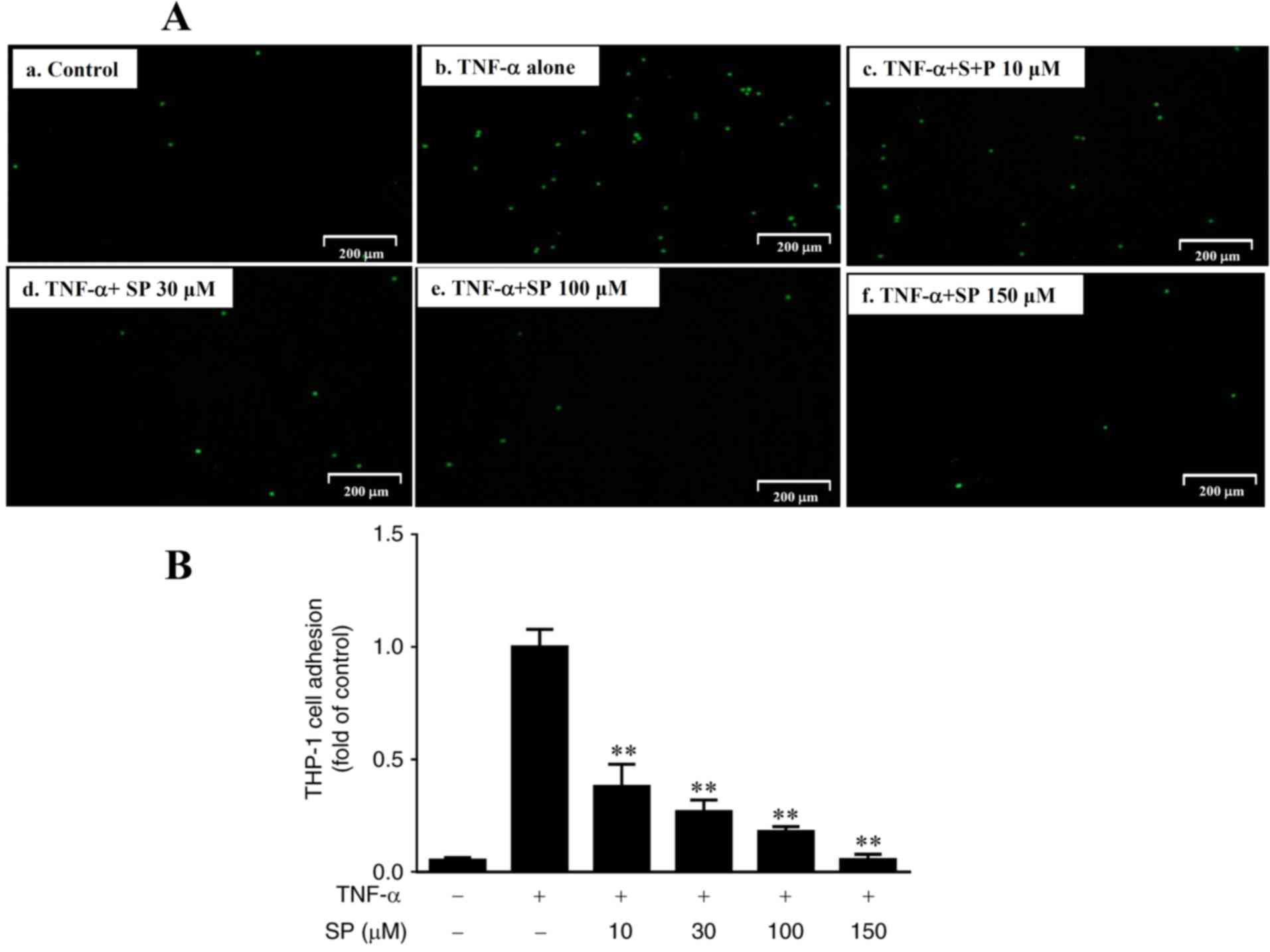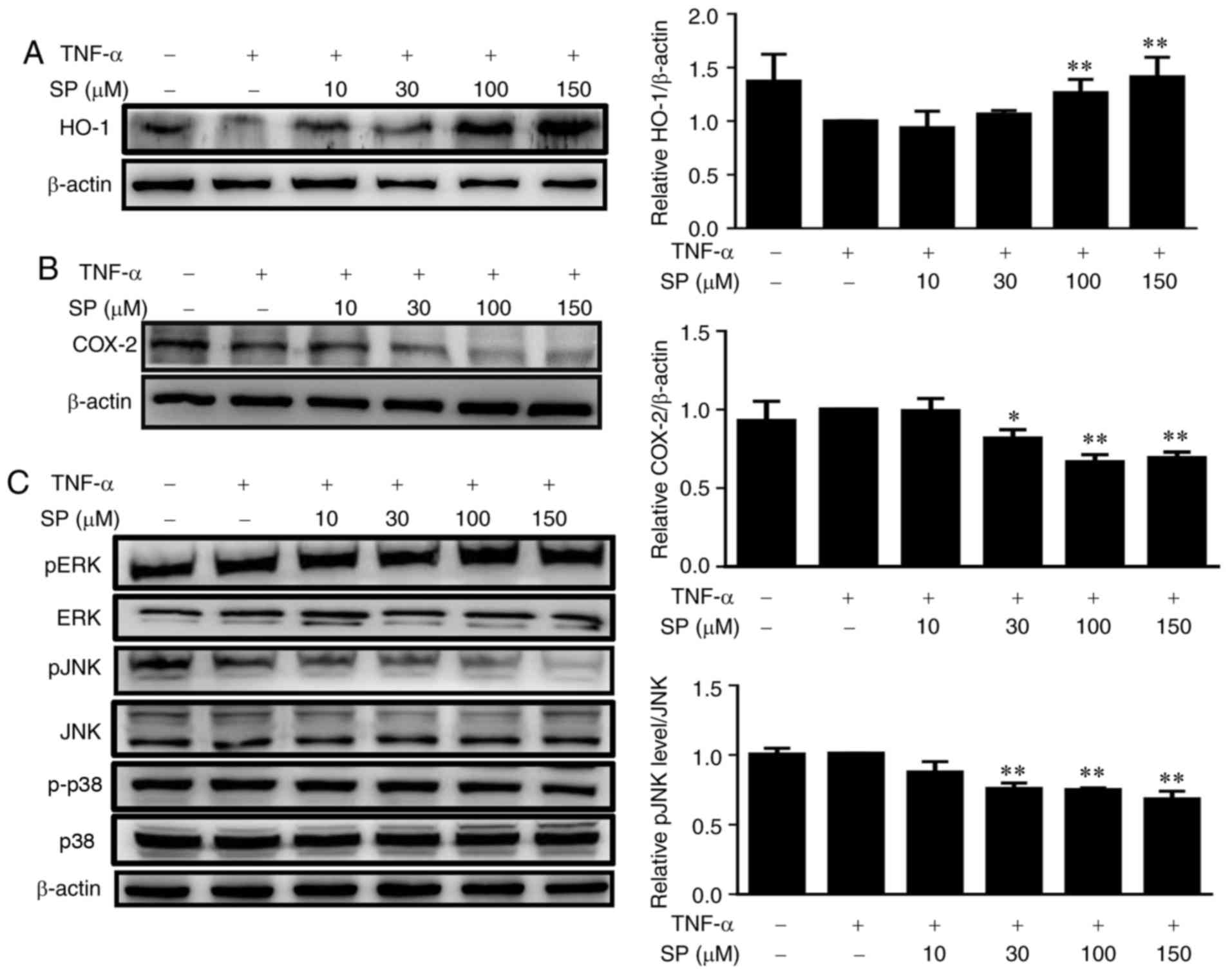|
1
|
Coman G, Blickenstaff NR and Maibach HI:
Skin and the environment. Rev Environ Health. 29:1432014.
View Article : Google Scholar : PubMed/NCBI
|
|
2
|
Subhan F, Kang HY, Lim Y, Ikram M, Baek
SY, Jin S, Jeong YH, Kwak JY and Yoon S: Fish scale collagen
peptides protect against CoCl2/TNF-α-induced cytotoxicity and
inflammation via inhibition of ROS, MAPK, and NF-κB pathways in
HaCaT cells. Oxid Med Cell Longev. 2017:97036092017. View Article : Google Scholar : PubMed/NCBI
|
|
3
|
Dustin ML, Singer KH, Tuck DT and Springer
TA: Adhesion of T lymphoblasts to epidermal keratinocytes is
regulated by interferon gamma and is mediated by intercellular
adhesion molecule 1 (ICAM-1). J Exp Med. 167:1323–1340. 1988.
View Article : Google Scholar : PubMed/NCBI
|
|
4
|
Youn GS, Kwon DJ, Ju SM, Choi SY and Park
J: Curcumin ameliorates TNF-α-induced ICAM-1 expression and
subsequent THP-1 adhesiveness via the induction of heme oxygenase-1
in the HaCaT cells. BMB Rep. 46:410–415. 2013. View Article : Google Scholar : PubMed/NCBI
|
|
5
|
Albanesi C, Scarponi C, Giustizieri ML and
Girolomoni G: Keratinocytes in inflammatory skin diseases. Curr
Drug Targets Inflamm Allergy. 4:329–334. 2005. View Article : Google Scholar : PubMed/NCBI
|
|
6
|
Middleton MH and Norris DA:
Cytokine-induced ICAM-1 expression in human keratinocytes is highly
variable in keratinocyte strains from different donors. J Invest
Dermatol. 104:489–496. 1995. View Article : Google Scholar : PubMed/NCBI
|
|
7
|
Kim H, Youn GS, An SY, Kwon HY, Choi SY
and Park J: 2,3-Dimethoxy-2′-hydroxychalcone ameliorates
TNF-α-induced ICAM-1 expression and subsequent monocyte
adhesiveness via NF-kappaB inhibition and HO-1 induction in HaCaT
cells. BMB Rep. 49:57–62. 2016. View Article : Google Scholar : PubMed/NCBI
|
|
8
|
Nedoszytko B, Sokołowska-Wojdyło M,
Ruckemann-Dziurdzińska K, Roszkiewicz J and Nowicki RJ: Chemokines
and cytokines network in the pathogenesis of the inflammatory skin
diseases: Atopic dermatitis, psoriasis and skin mastocytosis.
Postepy Dermatol Alergol. 31:84–91. 2014. View Article : Google Scholar : PubMed/NCBI
|
|
9
|
Kim MY, Lim YY, Kim HM, Park YM, Kang H
and Kim BJ: Synergistic inhibition of tumor necrosis
factor-alpha-stimulated pro-inflammatory cytokine expression in
HaCaT cells by a combination of rapamycin and mycophenolic acid.
Ann Dermatol. 27:32–39. 2015. View Article : Google Scholar : PubMed/NCBI
|
|
10
|
Banno T, Gazel A and Blumenberg M: Effects
of tumor necrosis factor-alpha (TNF alpha) in epidermal
keratinocytes revealed using global transcriptional profiling. J
Biol Chem. 279:32633–32642. 2004. View Article : Google Scholar : PubMed/NCBI
|
|
11
|
Karin M and Greten FR: NF-kappaB: Linking
inflammation and immunity to cancer development and progression.
Nat Rev Immunol. 5:749–759. 2005. View
Article : Google Scholar : PubMed/NCBI
|
|
12
|
Chang CF, Liao KC and Chen CH:
2-phenylnaphthalene derivatives inhibit lipopolysaccharide-induced
pro-inflammatory mediators by downregulating of MAPK/NF-κB pathways
in RAW 264.7 macrophage cells. PLoS One. 12:e01689452017.
View Article : Google Scholar : PubMed/NCBI
|
|
13
|
Wang JK, Xiong GM, Luo B, Choo CC, Yuan S,
Tan NS and Choong C: Surface modification of PVDF using
non-mammalian sources of collagen for enhancement of endothelial
cell functionality. J Mater Sci Mater Med. 27:452016. View Article : Google Scholar : PubMed/NCBI
|
|
14
|
Listopad J, Asadullah K, Sievers C, Ritter
T, Meisel C, Sabat R and Döcke WD: Heme oxygenase-1 inhibits T
cell-dependent skin inflammation and differentiation and function
of antigen-presenting cells. Exp Dermatol. 16:661–670. 2007.
View Article : Google Scholar : PubMed/NCBI
|
|
15
|
Kirino M, Kirino Y, Takeno M, Nagashima Y,
Takahashi K, Kobayashi M, Murakami S, Hirasawa T, Ueda A, Aihara M,
et al: Heme oxygenase 1 attenuates the development of atopic
dermatitis-like lesions in mice: Implications for human disease. J
Allergy Clin Immunol. 122(290–297): 297.e1–e8. 2008.
|
|
16
|
Barbosa AF, de Carvalho MG, Smith RE and
Sabaa-Srur AUO: Spilanthol: Occurrence, extraction, chemistry and
biological activities. Rev bras Farmacogn. 26:128–133. 2016.
View Article : Google Scholar
|
|
17
|
Elumalai A, Pendem N, Eswaraiah MC and
Naresh V: An updated annual review on antipyretic medicinal plants.
Int J Univers Pharm Life Sci. 2:207–215. 2012.
|
|
18
|
Chakraborty A, Devi RKB, Rita S,
Sharatchandra KH and Singh THI: Preliminary studies on
antiinflammatory and analgesic activities of Spilanthes acmella in
experimental animal models. Indian J Pharmacol. 36:148–150.
2004.
|
|
19
|
Wu LC, Fan NC, Lin MH, Chu IR, Huang SJ,
Hu CY and Han SY: Anti-inflammatory effect of spilanthol from
Spilanthes acmella on murine macrophage by down-regulating
LPS-induced inflammatory mediators. J Agric Food Chem.
56:2341–2349. 2008. View Article : Google Scholar : PubMed/NCBI
|
|
20
|
Hernández I, Márquez L, Martínez I,
Dieguez R, Delporte C, Prieto S, Molina-Torres J and Garrido G:
Anti-inflammatory effects of ethanolic extract and
alkamides-derived from Heliopsis longipes roots. J Ethnopharmacol.
124:649–652. 2009. View Article : Google Scholar : PubMed/NCBI
|
|
21
|
Nair JJ, Aremu AO and Van SJ:
Anti-inflammatory effects of Leucosidea sericea (Rosaceae) and
identification of the active constituents. S Afr J Bot. 80:75–76.
2012. View Article : Google Scholar
|
|
22
|
Ratnasooriya WD and Pieris KPP:
Attenuation of persistent pain and hyperalgesia by Spilanthus
acmella flowers in rats. Pharm Biol. 43:614–619. 2005. View Article : Google Scholar
|
|
23
|
Déciga-Campos M, Rios MY and
Aguilar-Guadarrama AB: Antinociceptive effect of Heliopsis longipes
extract and affinin in mice. Planta Med. 76:665–670. 2010.
View Article : Google Scholar : PubMed/NCBI
|
|
24
|
Arora S, Vijay S and Kumar D:
Phytochemical and antimicrobial studies on the leaves of Spilanthes
acmella. J Chem Pharm Res. 3:145–150. 2011.
|
|
25
|
Rosas-Piñón Y, Mejía A, Díaz-Ruiz G,
Aguilar MI, Sánchez-Nieto S and Rivero-Cruz JF: Ethnobotanical
survey and antibacterial activity of plants used in the Altiplane
region of Mexico for the treatment of oral cavity infections. J
Ethnopharmacol. 141:860–865. 2012. View Article : Google Scholar : PubMed/NCBI
|
|
26
|
Prachayasittikul S, Suphapong S,
Worachartcheewan A, Lawung R, Ruchirawat S and Prachayasittikul V:
Bioactive metabolites from Spilanthes acmella Murr. Molecules.
14:850–867. 2009. View Article : Google Scholar : PubMed/NCBI
|
|
27
|
Savadi R, Yadav R and Yadav N: Study on
immunomodulatory activity of ethanolic extract Spilanthes acmella
Murr. Leaves. Indian J Nat Prod Resour. 1:204–207. 2010.
|
|
28
|
Saritha KV and Naidu CV: Direct shoot
regeneration from leaf explants of Spilanthes acmella. Biol Plant.
52:334–338. 2008. View Article : Google Scholar
|
|
29
|
Boonen J, Baert B, Roche N, Burvenich C
and De Spiegeleer B: Transdermal behaviour of the N-alkylamide
spilanthol (affinin) from Spilanthes acmella (Compositae) extracts.
J Ethnopharmacol. 127:77–84. 2010. View Article : Google Scholar : PubMed/NCBI
|
|
30
|
Huang WC, Wu SJ, Tu RS, Lai YR and Liou
CJ: Phloretin inhibits interleukin-1β-induced COX-2 and ICAM-1
expression through inhibition of MAPK, Akt, and NF-κB signaling in
human lung epithelial cells. Food Funct. 6:1960–1967. 2015.
View Article : Google Scholar : PubMed/NCBI
|
|
31
|
Huang WC, Fang LW and Liou CJ: Phloretin
attenuates allergic airway inflammation and oxidative stress in
asthmatic mice. Front Immunol. 8:1342017. View Article : Google Scholar : PubMed/NCBI
|
|
32
|
Kundu J, Chae IG and Chun KS: Fraxetin
induces heme oxygenase-1 expression by activation of Akt/Nrf2 or
AMP-activated protein kinase α/Nrf2 pathway in HaCaT cells. J
Cancer Prev. 21:135–143. 2016. View Article : Google Scholar : PubMed/NCBI
|
|
33
|
Cho JW, Park K, Kweon GR, Jang BC, Baek
WK, Suh MH, Kim CW, Lee KS and Suh SI: Curcumin inhibits the
expression of COX-2 in UVB-irradiated human keratinocytes (HaCaT)
by inhibiting activation of AP-1: p38 MAP kinase and JNK as
potential upstream targets. Exp Mol Med. 37:186–192. 2005.
View Article : Google Scholar : PubMed/NCBI
|
|
34
|
Seo WY, Youn GS, Choi SY and Park J:
Butein, a tetrahydroxychalcone, suppresses pro-inflammatory
responses in HaCaT keratinocytes. BMB Rep. 48:495–500. 2015.
View Article : Google Scholar : PubMed/NCBI
|
|
35
|
Roy PK, Rashid F, Bragg J and Ibdah JA:
Role of the JNK signal transduction pathway in inflammatory bowel
disease. World J Gastroenterol. 14:200–202. 2008. View Article : Google Scholar : PubMed/NCBI
|
|
36
|
Zhai Y, Dang Y, Gao W, Zhang Y, Xu P, Gu J
and Ye X: P38 and JNK signal pathways are involved in the
regulation of phlorizin against UVB-induced skin damage. Exp
Dermatol. 24:275–279. 2015. View Article : Google Scholar : PubMed/NCBI
|


















